2012 Chevrolet Corvette Z06 vs. 2013 Nissan GT-R vs. 2012 Porsche 911 Carrera S
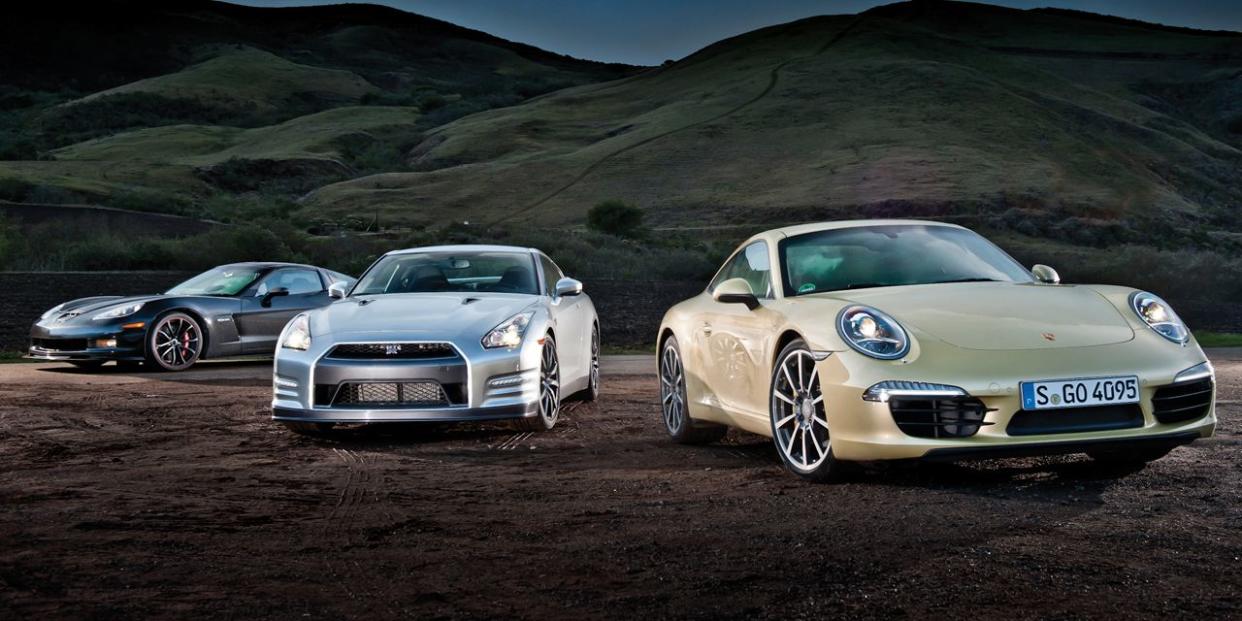

TESTED
The cuckoo clock in Zuffenhausen struck high noon recently and out popped a new 911, an event so freighted with anticipation by our little community that we lay in extra supplies of ink and binding glue for its arrival.
It’s all (okay, mostly) new. It’s been pulled out at the wheelbase and bumpers and pushed down at the roof, and it has aluminum in spots where steel once served. Maybe you have to squint to see the visual differences from its predecessor, but why would you expect anything else? A 911 must look like a 911 or—well, we don’t actually know the answer to “or what” because Porsche isn’t interested in finding out.
If you’re shopping the new 991-series Carrera S—which is denoted in our pricing software as the “New Coupe Carrera S,” as opposed to the old 997-series Carrera S that is being sold alongside it, both as 2012 models—you’re probably not among the Occupy Wall Street set; still, you’re less likely to be in the top one percent of earners than perhaps in the top 10 percent. The same goes for the other cars here: a 505-hp Chevrolet Corvette Z06 with an astonishing price tag to match its astonishing performance, and Nissan’s aero-android GT-R, with 15 more horsepower for 2013 on top of the 45 it received for 2012.
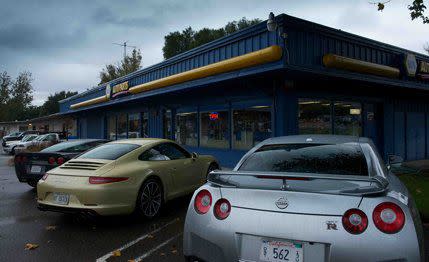
To the left, right, and center of $100K, this trio is expensive but still attainable if you're weathering the recession filing legal briefs, performing angioplasty, or just giving your best to The Man. Until just recently, the sports-car sweet spot was about $20K more affordable, and part of this tale is of an industry trend that, following airline tickets, gives you a couple of seats for one price while charging extra for a lot of the good stuff.
Take our Corvette. You get the 7.0-liter LS7 engine, the Z06 suspension, and two lumpy buckets for $76,500. Another $8815 puts you in the 3LZ package, which buys vastly improved power sport seats, plus a premium Bose stereo, power tilting/telescoping steering, head-up display, leather-wrapped dash, and some other frills. The Ultimate Performance package adds Brembo carbon-ceramic brakes, ZR1 carbon-fiber bits, and Michelin Pilot Sport Cup run-flat tires. Price: $11,495.
The Centennial Special Edition decals and logos celebrating Chevy’s 100th birthday, plus one thing we wouldn’t buy a Vette without, Magnetic Selective Ride Control, retail for $5345 (if you’re not feeling celebratory, you can get the magnetorheological shocks alone for $2495). Options total: $25,655, or one-third of the car’s base price.
The Ben Franklins fly even faster in Porsche’s showroom. The Carrera S’s Premium package with power seats costs $2940. Hydraulically adjusted anti-roll bars combined with electronic damping control: $4050. The sport exhaust: $2950. Black, red, white, and yellow are the no-cost exterior colors; our Lime Gold Metallic hue runs $3140. Carbon-ceramic brakes cost $8520 here. And so on. Options total: $33,900, or 35 percent of the base price.
Hey, we’d rather be talking about torque curves and lift-throttle oversteer, but today’s pricing strategies oblige us to devote space to making sense of the dollars. One outlier is the 2013 twin-turbo Nissan GT-R. The base price is expected to be about $92,500 once Nissan finally discloses it, and there are few options. In 2012, the GT-R extras were Super Silver paint, a backup camera, and logo-embroidered floor mats. That’s it. (We had none of those options on our car.) The ’13s, which have improved shift feel, the factory claims, plus the 15 extra horses, aren’t likely to be much different.
In our comparison test, three different cars with three different driveline configurations resulting from three different design philosophies hailing from three different nations can still produce only one winner.
You’ve heard it from us many times before: Behold the blue-collar supercar. Sure, the Corvette has flaws, but it’s one big sloppy Manwich of an automobile—cheap, high-calorie, and satisfying.
Well, our basic affinity for the Plastic Fantastic is sorely tested by a $102,155 window sticker, even if it’s a Z06 and includes the revised sport seats, which employ the old seat frames but with a new overlay of bolsters and cushions that, while still feeling a little flimsy, vastly improve comfort and support. Back in 2009, many of you had to be sold hard on the first $100,000-plus Corvette, the ZR1. In that instance, at least we had 638 supercharged horsepower and a few more carbon-fiber panels to enhance our case. (The ZR1’s 2012 base price is $113,500, and it comes with the magnetic dampers standard.)
We could happily prune this Z06 to just below 100 grand by deleting the Centennial pack. Among its other goodies, it puts black stickers on a black car (the only color choice with this option), and its price implies that you’re paying up front for what the package may someday do for the car’s Barrett-Jackson auction price.
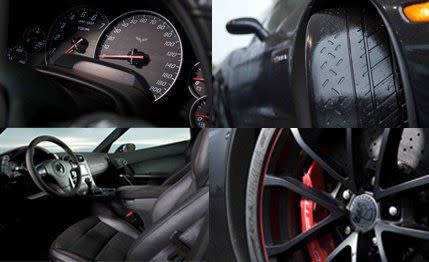
In the Corvette lineup, the Z06 is the track rat. It lacks the ZR1’s power overkill but has the same suspension that’s honed to a razor’s edge and aided by a menu of electronic stability programs to match your talent and self-preservation instinct. Add in the ceramic brakes and the Michelin Pilot Sport Cup quasi-slicks—the fronts being nearly the size of the Carrera’s rears—and you’ve got a car that excels in three key areas: entry, apex, and exit.
Predictably, the Z06 excelled during our test laps at California’s Buttonwillow Raceway Park. Under braking, the Corvette is flat and locked in the groove. Dial in steering, and it responds ferociously, without the heavy roll to the outside we’ve noted in Vettes of the recent past. And when the power is called back, you can easily manage the sideslip with the throttle. Note that its best-in-test skidpad performance exceeds 1.00 g, and braking beats all at 141 feet. A club racer could do worse than drive one off the showroom floor and onto the grid.
At 3259 pounds, this isn’t just the lightest car in this test by six pounds, it’s a lightweight in almost any group—exactly what sports cars are supposed to be (in case you’ve forgotten). But what makes the Z06 a great circuit circler is what makes it so demanding on public roads. The corner-seeking chassis doesn’t like an endless freeway straight. Palm the wheel to change lanes, and the Z06 may move over gently or with a slashing stroke—or sometimes with one and then the other if a pavement rut suddenly catches a tire.
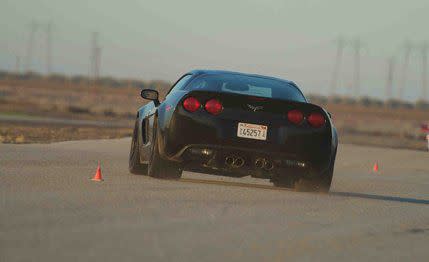
Divert your attention to the rent-a-car climate and nav controls and ponder for a second how out of place they are in a $100,000 (or even a $76,500) sports machine, and the car may just dart across two lanes and introduce itself to a pig hauler. Leave it at home on rainy days, when the Sport Cups resemble surfboards more than tires.
When the conditions are right, the Z06 is sublime and fabulously entertaining. But instead of waiting for the perfect conditions, we’d rather keep driving.
Both the Corvette and the Carrera are to some degree backward-looking, with modern technology packaged in nostalgic homages to old friends. Indeed, the 911 is so defined by its past and by the expectations of what it should be that it appears to have no future. And then there’s the GT-R, which isn’t trying to emulate anything, except perhaps the Tokyo-to-Nagoya bullet train.
Okay, there’s a legacy here, too, and the GT-R upholds it by being a hypersonic showboat for turbo all-wheel-drive technology. And also by sporting Frisbee-sized taillights evoking the previous-generation Nissan Skyline R34. Yet “new” and “strange” are not dirty words in this big machine. It does everything to its own beat, and the only thing its makers seem to fear is fear itself.
So, the GT-R is about absolute security. It wants to take you places at ridiculous speeds and with no slip-ups. Just try missing your turn-in point or sliding sideways out of a corner on a spurt of too much power. You can’t—at least, not without considerable effort. The GT-R accepts your commands with direct steering and quick shifts, it tempers your mistakes with traction devices and electronic aids, and it gives you the tools to link A with B in a minimum time frame. Sit back, relax, and enjoy the flight.
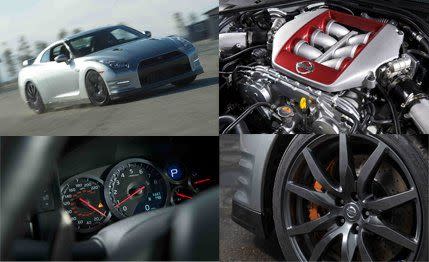
The Corvette roars. The 911 wails. The GT-R whirs and whines as though it’s running a mixture of Jet A and cesium-134. A sense of hugeness and heaviness is unavoidable in a car that is so huge and heavy, which makes its numbers all the more startling: three seconds flat to 60 mph and 11.2 seconds through the quarter-mile—and it’s not even the quickest GT-R we’ve ever tested. A 2012 model, less 15 horses, managed to dip below three seconds for a couple of runs. Launch control and raw traction are what pares down the GT-R’s numbers, but heavy rain the day before our testing probably hampered grip.
Except for a lack of sound insulation to quiet cabin noise, the GT-R would be our choice for comfy transcontinental travel.
Its weaknesses lie in its awkward design, both inside and out, and the delays it sometimes makes you endure. Upon starting, the car hesitates a few heartbeats before it’ll go into gear. Floor it in auto mode, and the quarter-seconds tick away while the six-speed dual-clutch transmission downshifts and the turbos come up to pressure. This is not the car for a last-minute decision to beat the Metrorail across the tracks.
Downshift manually if you want the 3.8-liter V-6 primed and ready to blow. While track lapping, it’s easier to tease out the car’s inner beast by keeping the engine boiling, and once it’s in the mood, the GT-R never fails to dazzle even its most vocal detractors.
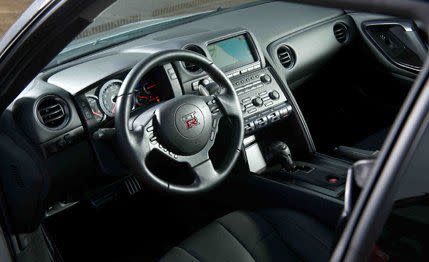
All-wheel drive has a couple of downsides besides the extra weight and fuel penalty (this was the test guzzler at 14 mpg). Namely, it produces understeer and dulls some feedback—though less than before—through the wheel. Despite having an extra 650 pounds to decelerate, this is the only car here without carbon-ceramic rotors. The brakes softened noticeably after a few hard laps.
That and the GT-R’s peculiar transmission rattle at idle are the only cracks in a pervasive sense of invulnerability, which is what a GT-R buyer gets for the money.
This is the best 911 ever, which means it’s less like a 911 than ever and now just a fabulous sports car that happens to have its engine in the trunk. A bad thing?
Judging from the heated banter on our online forum, this is a subject upon which reasonable people (plus a few whackjobs) may disagree. You can see where we land by the voting. Porsche has done what all car companies attempt to do with the overhaul of an icon: fix shortcomings while preserving the essence. In the case of the highly idiosyncratic 911, these goals are somewhat at loggerheads. But, as it often does, Porsche strikes an attractive balance.
It may look like the old Carrera, which in many ways looks like all of the 911s that precede it, but the new Carrera is more comfortable and significantly quieter inside, thanks to better isolation from tire rumble. It has none of that spooky steering slackness under acceleration, when load transfers off the already lightly burdened front tires. And it shows less of the nervous hopping through corners that makes older 911s such white-knuckle entertainment.
This new car is wired to its aluminum/steel gunwales with motherboards, from its electrically assisted, bump-filtering power steering to its electronic shocks aided by the electronically controlled hydraulic anti-roll system to its electronically activated Sound Symposer cabin megaphone. Yet the Carrera feels the purest and most tactile of this lot.
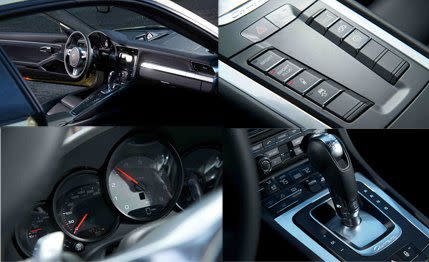
If the steering doesn’t bobble over rough patches as it once did, it does have a distinct mechanical hardness and an animated liveliness, accurately conveying the strain of tires holding a firm line. We’ve heaped scorn on electric-power-steering gears from other manufacturers. Perhaps the key is to have perfect steering to start with when you tune a new system.
The 3.8-liter flat-six returned the best fuel economy and a 0-to-60 time of 3.6 seconds, answering any prod with a rowdy burst of kinetic energy and the sound of titanium-headed timpani we expect from a Porsche. It wasn’t fitted with the seven-speed manual, but the PDK switches gears with brevity and well-oiled efficiency. Still, we’d prefer the manual, and not just to save the additional $4080 for the PDK.
With the 991-series, the Carrera officially feels big, and it’s not just that the car no longer tippy-toes around on a truncated wheelbase as it once did. The windshield base moves forward about three inches at its center point, greatly deepening the dash. For old 911 hands, the visual effect is akin to what movie cinematographers call a “dolly zoom,” in which an object in focus (say, the steering wheel) stays fixed while everything else seems to pull away. Studded with buttons, the sloping center console distinctly recalls the much larger Panamera, as do the shared window switches (which are blank where the rear-window buttons would be).
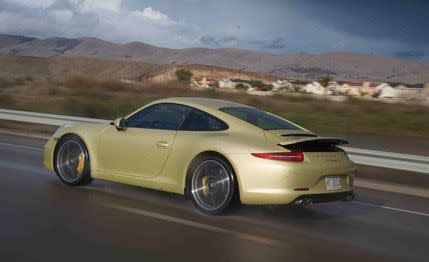
If it’s no longer as intimate, the new Carrera is certainly comfortable, the optional power buckets offering many adjustments to supply orthopedic support to taste. We just wish it weren’t so flipping expensive. With the options, many of which we consider essential to replicating our experience, this test car crowds the base price of the 2012-model 911 Turbo at $138,450.
Porsches have never been everyman affordable, and if someday they are, we’ll complain that the brand is soiled. Meanwhile, the new 911 S, six-figure tag notwithstanding, plugs in right where the old one once did, casting its golden glow on the enthusiast sweet spot.
You Might Also Like

